The Other Blu-ray Movie
HomeThe Other Blu-ray Movie 
Limited Edition to 3000 - SOLD OUTTwilight Time | 1972 | 100 min | Rated PG | Oct 08, 2013
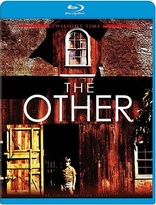
Movie rating
7.3 | / 10 |
Blu-ray rating
| Users | 4.8 | |
| Reviewer | 4.0 | |
| Overall | 4.2 |
Overview
The Other (1972)
Down in American farm country, twins are born. One of them turns out to be good, while the other becomes rather evil.
Starring: Diana Muldaur, Chris Udvarnoky, Uta Hagen, Martin Udvarnoky, John RitterDirector: Robert Mulligan
| Horror | Uncertain |
| Thriller | Uncertain |
| Drama | Uncertain |
| Mystery | Uncertain |
Specifications
Video
Video codec: MPEG-4 AVC
Video resolution: 1080p
Aspect ratio: 1.85:1
Original aspect ratio: 1.85:1
Audio
English: DTS-HD Master Audio Mono (48kHz, 24-bit)
Music: DTS-HD Master Audio 2.0 (48kHz, 24-bit)
Subtitles
English SDH
Discs
50GB Blu-ray Disc
Single disc (1 BD)
Playback
Region free
Review
Rating summary
| Movie | 4.5 | |
| Video | 5.0 | |
| Audio | 4.0 | |
| Extras | 1.5 | |
| Overall | 4.0 |
The Other Blu-ray Movie Review
This is no mere game. . .
Reviewed by Jeffrey Kauffman October 10, 2013Thomas Tryon seemed to be on the fast track to stardom, at least for a little while. Following the time honored tradition for young actors, Tryon appeared in television in the late fifties, including his own recurring series Texas John Slaughter that appeared on The Wonderful World of Disney, as well as occasional horror and science fiction B-movies, like I Married a Monster From Outer Space (isn’t it wonderful how those cheesy old films gave the audience their high concept in one deliciously camp-tastic title?). But then Tryon started getting better roles, in films like The Story of Ruth and The Longest Day (even while occasionally toiling in such less stellar fare as Moon Pilot). Tryon co-starred in the ill- fated Something’s Got to Give, the film Marilyn Monroe had begun shooting before her untimely death, something that might have temporarily halted Tryon’s trajectory, but in 1963, he was cast in what would become his signature role, the title character in Otto Preminger’s The Cardinal. While the film wasn’t especially well regarded, Tryon’s work in it was largely praised, but his subsequent film appearances became more and more sporadic as the decade wore on. And then something quite remarkable happened—Tryon reinvented himself as a bestselling author. The Other was instantly hailed as a modern classic when it appeared in 1971 and Tryon himself co-produced and wrote the 1972 film adaptation. Many years ago I had the pleasure of meeting Harrison Starr, who had a long and rather quirky producing career, but who had been Production Manager on Preminger’s The Cardinal. Starr was a tenant of my late Uncles in New York City, and knowing of my interest in the film industry, they arranged for me to have lunch with him one day in Manhattan. I had fallen in love with both the novel and film versions of The Other and, knowing of The Cardinal connection, mentioned Tryon to Starr. Starr countered to me that Tryon had never been really happy as an actor, and that this “second” career choice seemed to be much more up his alley. Strangely The Other, despite its overwhelming success on the bestseller charts, didn’t really seem to connect with movie audiences at the time of its release, but it’s since achieved a certain cult status. The film remains a kind of oddity in director Robert Mulligan’s oeuvre, a sort of Twilight Zone reimagining of the same feeling Mulligan brought to To Kill a Mockingbird , but it is graced by uniformly excellent performances (including a rare film role for stage icon Uta Hagen), and it also features gorgeous music from Jerry Goldsmith and cinematography from Robert L. Surtees.
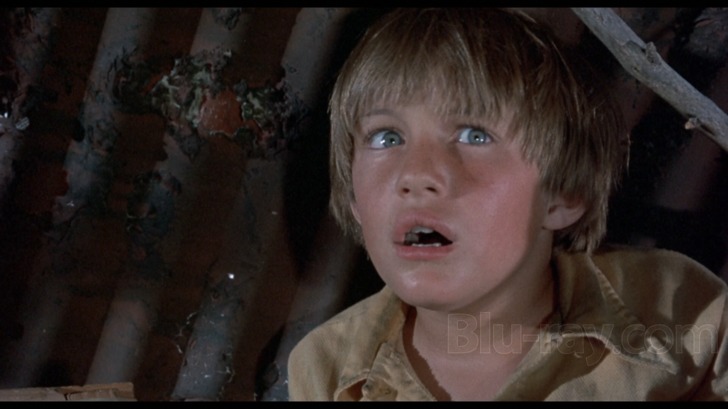
The Other is not a traditional horror film, and in fact is more of a psychological drama with horror underpinnings. Tryon’s novel was an interesting study in dissociation, veering between first person observations and more traditional third person narrative, something that hinted at the fractured nature of a central character. Tryon’s screenplay obviously can’t quite duplicate that gambit, and yet he and director Mulligan deal with what is the story’s central conceit brilliantly. No actual spoilers will be posted here, but pay close attention to how many characters are in the frame at any given moment for a rather stunning example of just how smart Tryon and Mulligan played the tricky hand they were dealt.
The story of The Other is ostensibly about two twins, Niles (Chris Udvarnoky, who sadly passed away in 2010) and Holland (Martin Udvarnoky) Perry, who live on their family farm in the mid-1930s. Their troubled mother (Diana Muldaur) is a recluse, obviously suffering from some kind of mental anguish and confining herself largely to her upstairs bedroom. The boys’ grandmother, Ada (Uta Hagen), is a Russian émigré who has taught the boys a mystical “game” where they, a la “Wart” with Merlin in The Once and Future King, are able to inhabit the consciousnesses of other beings.
What seems to be a case of one twin being good, the other being evil, plays out in a series of increasingly disturbing murders, one of which echoes the then current Lindbergh baby kidnapping (something which is explicitly referenced in the film itself). Mulligan plays his cards fairly close to the vest until slightly past the one hour mark, when a major reveal is offered, but even then, the palpable sense of dread which has already been established is not mitigated, and in fact builds to almost unbearable levels of tension. All of this is despite the fact that very little violence is shown in The Other. This is one of the most discursive “horror” films in memory, one which establishes its spooky ambience almost entirely through implication rather than outright depiction.
Believe it or not, Thomas Tryon also wrote a lyric for a slightly tweaked version of Jerry Goldsmith’s main theme for The Other. I was thrilled to get the music in an Armed Forces Song Folio that my sister sent me when she was managing a U.S. Army Base Service Club in Germany back in the day. It may not exactly be Academy Award material, but it’s a fascinating attempt to make a lovely theme into a more or less traditional love song, something that perhaps seems a bit odd given the film’s subject matter. For those who have never seen/heard it, here’s Tryon’s work:
Yes, I know your eyes
They’re the same eyes
And for me they hold no surprise
Yet how strange from to time they change
Till they become two other eyes
And just now and then
When you’re speaking
There’s a different voice, unfamiliar
And I think when it reaches my ear
It’s a stranger’s voice that I hear
And I know your smile
Seldom varies
It’s the same sweet smile I recall
Still at times for a just a little while
It’s really not your smile at all
Now and then your face
Seems another
It’s the other face I discover
But your face is the face I adore
There’s no other face I love more
It’s the dearer face
The nearer face
It’s your face
The Other Blu-ray Movie, Video Quality 
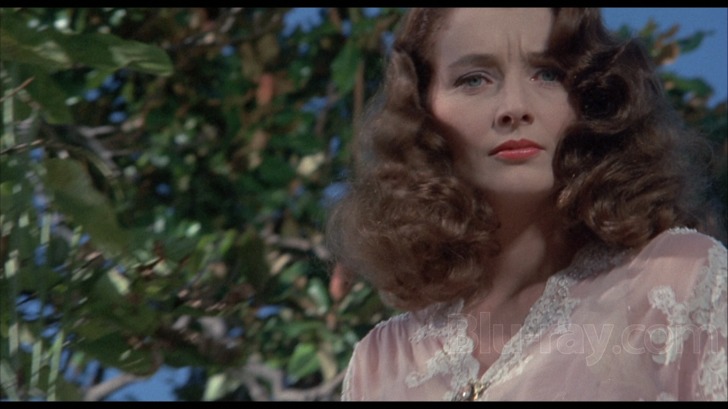
The Other is presented on Blu-ray with an AVC encoded 1080p transfer in 1.85:1. This is a near perfect accounting of the film's theatrical look, with the original soft, filtered, dewy ambience that cinematographer Robert Surtees brought to this project. Mulligan tends to use the then trendy zoom lenses for a number of shots, and that may seem to add even a bit more of softness as the frame quickly changes, but in fact it's an accurate representation of the theatrical exhibition, one which I actually saw several times as a child (my parents thought I was patently crazy when I kept asking them to drive me back to the theater so that I could see The Other again—and again—and again). The elements here are largely pristine, and color grading, while perhaps just a trifle too pink (at least for my tastes), offers a wonderfully bright and ironically sunny palette that contrasts beautifully with the darker underpinnings of the story. There are no egregious artifacts to report and the film retains a completely natural looking grain structure.
The Other Blu-ray Movie, Audio Quality 
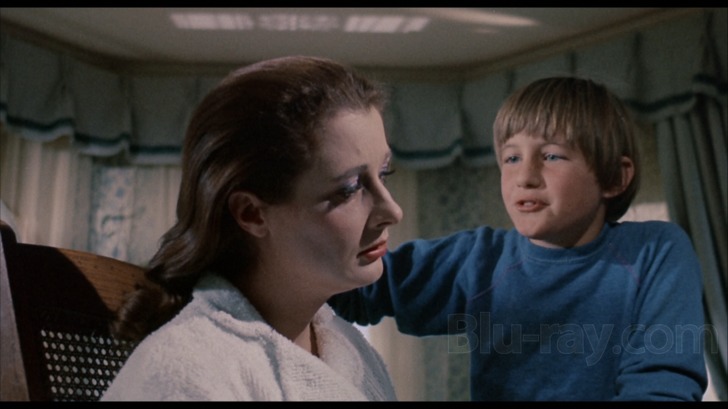
The Other offers a lossless DTS-HD Master Audio Mono mix which recreates the rather surprisingly overall quiet ambience of the film quite well. Goldsmith's score sounds fantastic (I actually prefer this accounting to the isolated score, as that one's highs are too strident to my personal taste), and the dialogue is presented cleanly and clearly. A couple of horrific moments add a bit of dynamic range, but this is by and large a rather subdued outing from an aural perspective.
The Other Blu-ray Movie, Special Features and Extras 
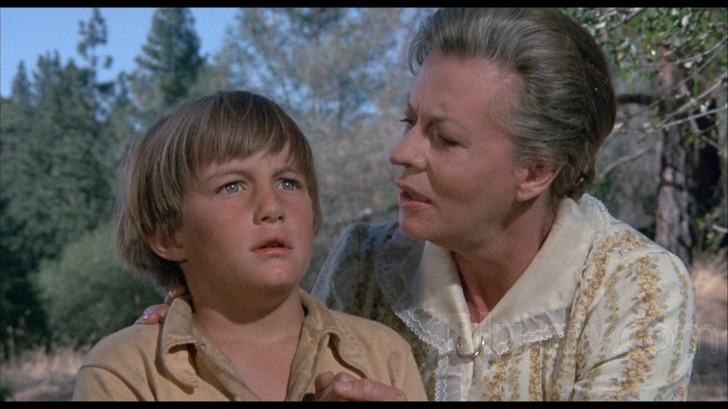
- Original Theatrical Trailer (480p; 3:10)
- Isolated Score Track. Jerry Goldsmith's elegiac score is presented via DTS-HD Master Audio 2.0. This is significantly brighter sounding than the original soundtrack, to the point that some of the string cues sound slightly brittle. Goldsmith's spoken conducting cues and some studio chatter are also included. This is in some ways my favorite of all of Goldsmith's work, a magical blend of lyrical cues and more forceful dramatic moments. If I may be permitted to put on my musician's hat for a moment and get just a little technical, listen for example to how perfectly Goldsmith establishes a creepy yet weirdly peaceful ambience right off the bat in the opening credits. The whistling of the main theme initially seems to be tracing out a chord in Bb, which then segues to a final F note, implying a chord of F over an A bass (as Goldsmith in fact utilizes later in the score), But then the actual orchestral cue comes in on the completely unrelated key of E minor (though the chord at that moment is actually C major), with the melody stepping up from E to F# (a cross-relational "error" to the F which just sounded), creating an instant skewing of tonal certainty. It's an obviously subliminal moment, but it perfectly sets the mood for the film. Later, when Ada plays "The Game" with Niles, Goldsmith completely transforms the theme into 6/8, giving it a rushing momentum that perfectly captures Niles' literal bird's eye view of the farmland. These are just two of many examples highlighting Goldsmith's impeccable achievement with this score.
The Other Blu-ray Movie, Overall Score and Recommendation 
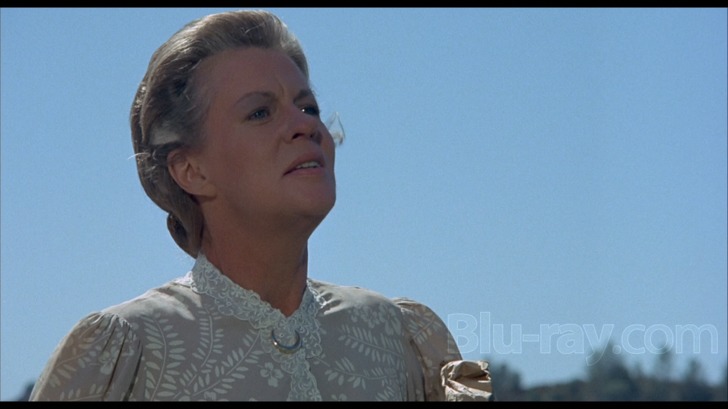
As is probably obvious by this time, I have loved The Other since I was a kid, and it's a joy to see it looking and sounding so fantastic. Don't be fooled by what may seem like an "obvious" reveal late in the film. The Other is actually open to interpretation, and I refer you to Ada's "game" for one way to approach what's really going on. This is not a typical horror film, which in fact may be one reason that it failed to connect with audiences in 1972, but it is nonetheless a relentlessly disturbing piece that offers the flip side of the relatively halcyon childhood Mulligan portrayed in his classic To Kill a Mockingbird. Highly recommended.
Similar titles
Similar titles you might also like

Marrowbone
The Secret of Marrowbone
2017

The Haunting of Hill House
Extended Director's Cut
2018

The Haunting in Connecticut 2: Ghosts of Georgia
2013

The Legend of Hell House
1973

The Quiet Ones
2014

Stonehearst Asylum
Eliza Graves
2014

The Skeleton Key
2005

The Others
2001

Winchester
2018

The Harvest
2013

Hands of the Ripper
1971

The Haunting
1963

Paranoiac
Collector's Edition
1963

Murder Obsession
Follia omicida
1981

Let's Scare Jessica to Death 4K
Slipcover in Original Pressing
1971

The Turning
2020

The Lodgers
2017

The Boy
2016

The Night Evelyn Came Out of the Grave
La notte che Evelyn uscì dalla tomba
1971

Dementia 13
Director's Cut
1963